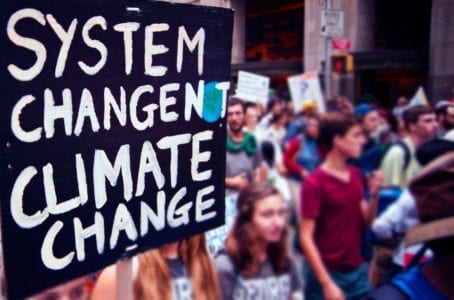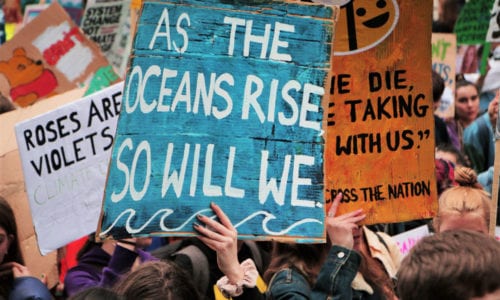What hampers ‘political’ action in environmental alternative action organizations?
—Exploring the scope for strategic agency under post-political conditions
Journal Paper by Joost de Moor, Philip Catney and Brian Doherty
Social Movements Studies | Published online: 25 Dec 2019 | Open Access

Abstract
The proliferation of environmental alternative action organization (EAAOs) is a defining feature of present-day environmentalism. The literature on sustainable materialism has celebrated this as an appropriate, effective, and above all, political strategy. By contrast, drawing on post-political and post-ecologist critiques, some have argued that this shift signifies the de-politicisation of environmentalism because it leaves the status quo unchallenged. In this article, we argue that these opposing views can be reconciled first by considering that ‘the political’ has at least three different dimensions, and second by taking account of how activists reflexively navigate the different challenges posed by each of these dimensions in their strategizing. Based on an ethnographic case study of two organizations in Manchester (UK), we show that while EAAOs developing environmental alternatives may indeed be motivated by radical ideas—as suggested in literature on sustainable materialism—the contradictory demands of diffusion and agonism limit their expression through contentious action. We argue that the post-political context in which these groups operate thus has some depoliticizing impact, yet that activists consciously navigate these challenges to maximize their political impact.
Introduction
Building on theories on the post-political condition (e.g. Mouffe, 2005; Swyngedouw, 2009; Žižek, 2000), this article analyses (de-)politicization in environmental ‘alternative action organizations’ (AAO) (Giugni & Grasso, 2018; Kousis, Giugni, & Lahusen, 2018). AAOs have been defined as ‘collective bodies engaged in carrying out alternatives to dominant socioeconomic and cultural practices’ (Zamponi & Bosi, 2018). Environmental AAOs (hereafter EAAOs) focus on the promotion of ‘sustainable materialism’ (Schlosberg & Coles, 2016) through ‘the development of alternative systems and counterflows of both power and goods’ with the aim to construct ‘different practices, institutions, [and] systems for meeting some of our basic material needs—food, energy, and clothing—in more just and sustainable ways’ (Schlosberg, 2019, p. 1).
The growth and spread of EAAOs has become of keen interest to scholars of environmentalism in recent years. Their alternatives have been welcomed by some as deeply political means to enhance ecological democracy (Eckersley, 2019; Schlosberg, 2019; Schlosberg & Craven, 2019). Yet others have critiqued this turn as a form of de-politicisation, highlighting how alternatives have a tendency to be marginal and non-confrontational in nature (e.g. Alkon & Guthman, 2017; Maniates, 2001; Thörn & Svenberg, 2016), or even that they are merely simulating politics, sustaining rather than challenging society’s unsustainability (Blühdorn, 2014, 2017).
As our ethnographic analysis of two EAAOs in Manchester (UK) demonstrates, this academic debate is also reflected in activists’ discussions around strategic dilemmas. Understanding how such dilemmas unfold in the context of today’s environmental politics is vital. Of course, EAAOs and sustainable materialism have been around since the dawn of environmental movements, and so have discussions about reformist and radical strategies (Doherty, 2002). Yet given the intensification of threats to global ecosystems, even as environmental issues and environmental movements have become mainstream, the question of how environmentalists deal with the challenge of deciding on an appropriate strategy has become even more compelling.
Our article emphasizes the tension between environmentalists’ radical ambitions on the one hand, and pragmatic organizational considerations on the other. We suggest that competing arguments about (de-)politicization can be reconciled if we assess the political as having three different dimensions: critical political ideas, agonistic theories of social change, and contentious action to challenge power. Differentiating the political in this way allows us to show how EAAOs can be seen as strategic actors, pursuing political and social change in a post-political context that requires them to balance radicalism against the diffusion of their projects. Consequently, their experience is that opposing ‘environmental bads’ can be hard to reconcile with a focus on promoting ‘environmental goods,’ even though both are seen as instrumental to bringing about social change. Thus, we complicate sustainable materialism’s depiction of EAAOs as political by showing that being motivated by radical ideas is just one dimension of the political and may not always find expression in strategic practice. Yet we also qualify the post-political and post-ecologist critique by showing that activists are working with a reflexive awareness of the limits of their own agency, suggesting that they are not simply depoliticized simulations of politics, but pursuing a strategy based on their own reading of systemic constraints.
Link
The article is available in open access format on the Taylor & Francis website. If you have difficulties accessing the paper, please get in touch: info@cusp.ac.uk.






